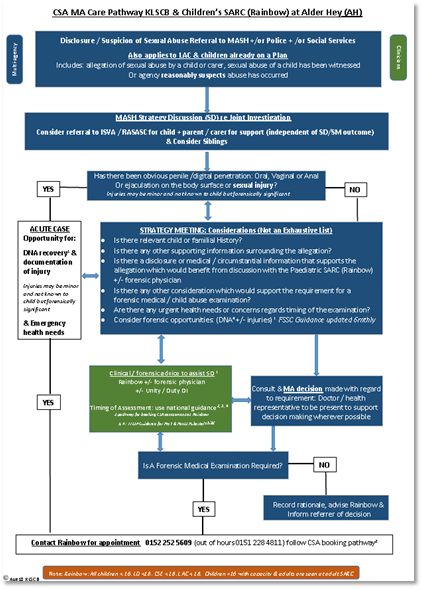11.13 How to Respond if a Child Discloses Sexual Abuse
See also:
Child Sexual Abuse multi-agency Care Pathway:
11.13 How to Respond if a Child Disclosed Sexual Abuse
- Listen carefully – Whilst this may seem obvious, it is important to try and absorb everything the child says in their own language, even though you might feel shocked or even repelled by what they are telling you.
- Give time and attention – Children often disclose abuse to an adult, when they think that person is distracted as they may feel embarrassed or anxious about how the adult will respond. If this happens, it is important to tell the child that what they are telling you is really important and then provide a time when you can give them your full attention.
- Allow the child to give a spontaneous account – This is very important from the point of view of any court proceedings that may follow. You must not lead a child or put words into their mouth. By all means be receptive to the child, but do not probe or question them, leave this to the investigating social worker/police officer.
- Do not offer false confidentiality – Many children, before revealing something of this nature will say to the adult, “if I tell you something, will you promise not to tell? ” Where issues to do with child protection are concerned, you cannot give that confidentiality and will inevitably betray their trust when you eventually have to break that promise. Instead, let the child know that if it has implications for their safety or the safety of others, then you cannot keep that information to yourself. It is also helpful however, to be honest with the child about what needs to happen and to involve them as much as possible.
- Empathise with the child – Try to get in touch with the child’s feelings about what has happened. Don’t impose your feelings on the situation. You may for instance feel angry towards the abuser, but the child may not.
- Reassure the child – As someone whom the child has trusted with this very sensitive information, you need to offer some reassurance. They may feel guilty for telling, responsible for the abuse, or scared about the consequences. It is therefore imperative, that you convey to the child that they were right to tell you and that they have done nothing wrong. Also, that you tell them what you intend to do next and keep them informed of what is happening.
- Recording is essential – Any notes you make about your discussions with the child may be submitted to court and form part of the evidence in a criminal trial. It is important to record what was said (using the child’s own language), what was being discussed immediately prior to the disclosure and who was present. Also include any observations of the child during the discussion, which you feel may be important.
- Always tell Social Services – You must inform Social Services as soon as is practicable. It is essential that you do not discuss this with the alleged abuser, as this will almost certainly compromise any investigation and may place the child at further risk.
- Do not investigate – A final reminder, that a team of specially trained professionals will investigate the allegation(s) and direct questioning of the child should be left to them. Having to keep going over the same events can be distressing for the child and is likely to devalue their statement from an evidential point of view.

